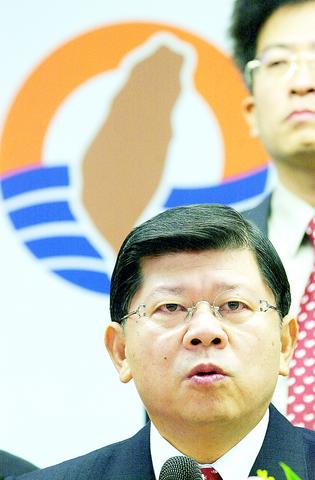The recent defection of former KMT lawmaker and organization official Chen Horng-chi (
"By joining the TSU, I want to help keep Lee's legacy alive," he told reporters on Monday after taking helm of the TSU's organization department. "I was deeply moved by Lee's passion and resolve to serve the country despite his old age."
The first task facing the new TSU organization head is to help send seven colleagues to Taipei City Council on Dec. 7. Over 200 candidates are fighting to win a berth in the 52-seat body.

PHOTO: CHEN CHENG-CHANG, TAIPEI TIMES
Allies and critics had predicted Chen's change of political affiliations after he lost his legislative seat representing the capital's southern district last December.
"There is nothing strange about Chen's switchover as he has identified with the TSU in major policy areas," TSU Chairman Huang Chu-wen (
During his stint as lawmaker between 1996 and last year, Chen belonged to the KMT's Generation-E Alliance, a legislative faction that is known for its pro-localization ideology. The term refers to efforts to make developing Taiwan the ultimate goal in itself instead of a bigger ambition involving China.
Chen said the KMT, under the leadership of Chairman Lien Chan (
"The party has looked at the cross-strait issue through a pro-Beijing lens and refuses to listen to dissenting opinions," he said. "Disappointed, I had no choice but to leave. More will take the same step in the future, I believe."
Indeed, the TSU since its birth 14 months ago has been actively approaching politicians of all stripes to expand its power base.
TSU Secretary-General Lin Jih-jia (
Former president Lee has said he still has influence over a number of KMT legislators -- claims that have caused the former ruling party to question the loyalty of members sympathetic to its former chairman.
Chen Horng-chi, for instance, has been under suspicion. In April last year, he joined forces with DPP legislators in pressuring the Japan Interchange Association in Taipei to grant Lee a visa for medical trips to the country.
Later the same year, he raised more eyebrows by calling on his party to cooperate with the DPP instead of the PFP after the legislative elections.
"If the KMT sticks with the so-called opposition alliance, the party will continue its decline," he said then.
"But by forming a coalition government, it could help preserve stability and fend off China's intimidation tactics."
Days later, he and fellow KMT legislative candidate Chen Hsueh-fen (
KMT lawmaker Apollo Chen (
In the end, both Chen Horng-chi and Chen Hsueh-fen lost the race, due mainly to overnomination on the part of the opposition camp.
James Chen (
"I understand his desire to make a political comeback and the party appointed him as deputy organization head and a consultant at its think tank in line with his professional strength," he said.
Chen Horng-chi worked as a National Assembly member before winning a seat in the legislature. He headed to the Japan-based Nihon University and Kinki University for further education after completing junior college in Taiwan.
Calling his former colleague ungrateful, James Chen said Chen Horng-chi is no match when it comes to mobilizing voter support.
"He does not know as many people as I do nor is he more localized than me," he said.

The manufacture of the remaining 28 M1A2T Abrams tanks Taiwan purchased from the US has recently been completed, and they are expected to be delivered within the next one to two months, a source said yesterday. The Ministry of National Defense is arranging cargo ships to transport the tanks to Taiwan as soon as possible, said the source, who is familiar with the matter. The estimated arrival time ranges from late this month to early next month, the source said. The 28 Abrams tanks make up the third and final batch of a total of 108 tanks, valued at about NT$40.5 billion

Two Taiwanese prosecutors were questioned by Chinese security personnel at their hotel during a trip to China’s Henan Province this month, the Mainland Affairs Council (MAC) said yesterday. The officers had personal information on the prosecutors, including “when they were assigned to their posts, their work locations and job titles,” MAC Deputy Minister and spokesman Liang Wen-chieh (梁文傑) said. On top of asking about their agencies and positions, the officers also questioned the prosecutors about the Cross-Strait Joint Crime-Fighting and Judicial Mutual Assistance Agreement, a pact that serves as the framework for Taiwan-China cooperation on combating crime and providing judicial assistance, Liang

A group from the Taiwanese Designers in Australia association yesterday represented Taiwan at the Midsumma Pride March in Melbourne. The march, held in the St. Kilda suburb, is the city’s largest LGBTQIA+ parade and the flagship event of the annual Midsumma Festival. It attracted more than 45,000 spectators who supported the 400 groups and 10,000 marchers that participated this year, the association said. Taiwanese Designers said they organized a team to march for Taiwan this year, joining politicians, government agencies, professionals and community organizations in showing support for LGBTQIA+ people and diverse communities. As the first country in Asia to legalize same-sex

MOTIVES QUESTIONED The PLA considers Xi’s policies toward Taiwan to be driven by personal considerations rather than military assessment, the Epoch Times reports Chinese President Xi Jinping’s (習近平) latest purge of the Chinese People’s Liberation Army (PLA) leadership might have been prompted by the military’s opposition to plans of invading Taiwan, the Epoch Times said. The Chinese military opposes waging war against Taiwan by a large consensus, putting it at odds with Xi’s vision, the Falun Gong-affiliated daily said in a report on Thursday, citing anonymous sources with insight into the PLA’s inner workings. The opposition is not the opinion of a few generals, but a widely shared view among the PLA cadre, the Epoch Times cited them as saying. “Chinese forces know full well that